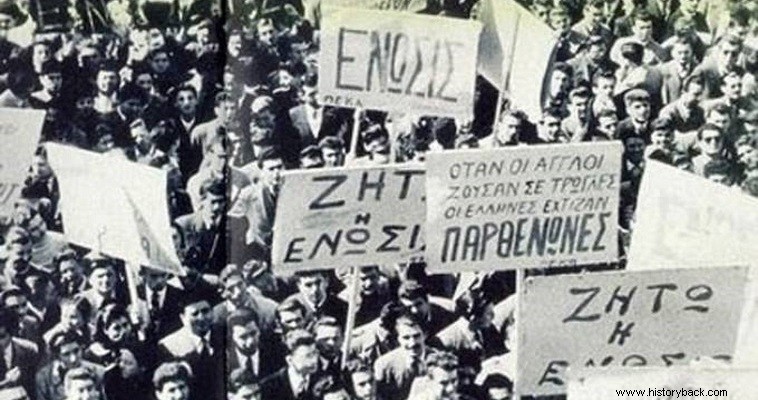
Cyprus, in its centuries-long historical course, has known many foreign dynasties. It was severed from the national trunk in 1191 AD. after its capture by the Crusaders of the 3rd Crusade. Since then it passed successively under the rule of the Lusignan house and then of Venice. In 1571 it was occupied by the Turks.
In 1878 the Turks ceded it to the British, with an annual rent of 92,800 pounds. The Cypriots initially welcomed this change, considering that the British would allow, at least in time, their union with Greece, as they had done with the Ionian Islands. Throughout the British occupation, the Greek Cypriots never stopped seeking union with the Motherland.
In 1889 a Cypriot delegation went to London and demanded union with Greece. In 1895 rallies were held throughout the island demanding union. The outbreak of the Greek-Turkish war, in 1897, caused a general mobilization in Cyprus and more than 6,000 Cypriots rushed to enlist in the Greek Army. New rallies were held on the island in 1902 and 1907, always with the same request.
In 1912-13 the outbreak of the Balkan Wars rekindled the desires of the Cypriots. And then a new wave of volunteers from the mega island flooded motherland. However, the British not only did not respect the feelings of the Cypriots, but in 1914, they officially annexed Cyprus as a possession of the Crown. The end of World War I, in which 11,000 Cypriots fought for ANTAD, brought back the question of union.
In 1915, Britain raised the issue of ceding Cyprus to Greece on the condition that the country exit the war in favor of ANTATE. The Greek government at the time did not accept the proposal, as the British were simultaneously requesting the concession from Greece to Bulgaria of the wider area of Kavala. In other words, they granted one Greek region to Greece, depriving it of another.
In 1921, on the occasion of the 100th anniversary of the revolution of 1821, rallies and demonstrations broke out all over Cyprus, always with the same request, the union with the Motherland. In 1928, new rallies shook the island, on the occasion of the 50th anniversary of the British occupation of Cyprus.
A year later, a Cypriot delegation, led by Metropolitan Nikodimos of Kiti, went to London again, demanding the union of Cyprus with Greece. At the same time, the Cypriots also turned to the Greek government, looking for support, but the doors were closed, from the then government of El. Venizelou.
Frustrated with the British and the Greek government, the Cypriots decided to take matters into their own hands. Always led by the Metropolitan of Kiti, on October 21, 1931, the people of Nicosia openly rebelled against the occupying forces. Deadly clashes followed. The demonstrators stoned the government, but the intervention of the British Army swept away the unarmed Cypriots, leaving dozens dead and hundreds wounded behind.
The Greek government was silent again. And the leaders of the rebellion, first and foremost the Metropolitan of Kiti, were exiled. The then prime minister of Greece, Eleftherios Venizelos, refused to support, even in words, the Cypriot rebellion. There followed, until 1940, a period of brutal oppression of the Cypriots, which was interrupted by Greece's involvement in World War II.
Then the British remembered the Cypriots again and addressed them with continuous appeals to enlist in the British Army and fight for "Greece and freedom". In May 1941, after the occupation of Crete by the Germans, the Greek government and King George II asked Churchill to allow them to settle in Cyprus and proceed with the concession of the island to Greece, as a goodwill gesture. Again the British refused.
When the Second World War did not end, some took care to keep the devastated Greece in a state of war. Thus it was not possible to claim the liberation of the unredeemed territories – Northern Epirus, Dodecanese, Cyprus. Finally, the British, not easily, returned the Dodecanese to Greece in 1948. However, they kept a fishy silence about Cyprus.
